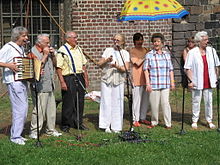Edelweiss Pirates
The origins of the Edelweißpiraten can be traced to the period immediately prior to World War II, as the state-controlled Hitler Youth (Hitler-Jugend) was mobilized to indoctrinate young people, at the expense of the leisure activities previously offered to them.
The Edelweißpiraten used many symbols of the outlawed German Youth Movement, including their tent (the Kohte), their style of clothing (the Jungenschaftsjacke [de]), and their songs.
Individual groups were closely associated with different regions but were identifiable by a common style of dress with their own edelweiss badge and by their opposition to what they saw as the paramilitary nature of the Hitler Youth.
[2] Subgroups of the Edelweißpiraten included the Navajos, centered on Cologne, the Kittelbach Pirates of Oberhausen and Düsseldorf, and the Roving Dudes of Essen.
Despite this, they represented a group of youth who rebelled against the government's regimentation of leisure and were unimpressed by the propaganda touting Volksgemeinschaft (people's community).
[3] Apart from gatherings on street corners, the Edelweißpiraten engaged in hiking and camping trips, defying the restrictions on free movement, which kept them away from the prying eyes of the totalitarian regime.
[citation needed] Nevertheless, government repression never managed to break the spirit of most groups, which constituted a subculture that rejected the norms of Nazi society.
In the early days of the Allied occupation, they sought contact with the occupying authority to intervene on behalf of friends, and even to propose that they might go on patrol, as did the Wuppertal Edelweißpiraten.
[citation needed] Groups identifying themselves as Edelweißpiraten conducted many violent attacks against Soviet Russian and Polish displaced persons.
[10] In a trial held by a military court at Uelzen in April 1946, a juvenile named as "Heinz D." was initially sentenced to death, for his "very active part in carrying out the nefarious schemes of the E. Piraten.
[12] In April 2011, Cologne's mayor, Jürgen Roters, presented Theilen and four other survivors, including Gertrud Koch, the Order of Merit of the Federal Republic of Germany.

